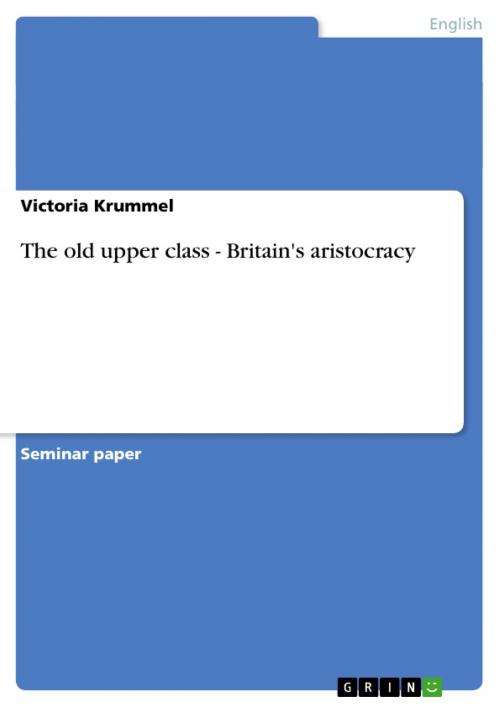The old upper class - Britain's aristocracy
Britain's aristocracy
Nonfiction, Reference & Language, Study Aids, ESL, Foreign Languages| Author: | Victoria Krummel | ISBN: | 9783638236362 |
| Publisher: | GRIN Publishing | Publication: | November 29, 2003 |
| Imprint: | GRIN Publishing | Language: | English |
| Author: | Victoria Krummel |
| ISBN: | 9783638236362 |
| Publisher: | GRIN Publishing |
| Publication: | November 29, 2003 |
| Imprint: | GRIN Publishing |
| Language: | English |
Seminar paper from the year 1998 in the subject English Language and Literature Studies - Culture and Applied Geography, grade: 2.0 (B), University of Osnabrück (Anglistics), 14 entries in the bibliography, language: English, abstract: In his personal comment 'On Britain' Ralf Dahrendorf detected the continuation of a powerful, self-confident and easily identifiable upper class lacked by other modern countries like Germany or France and the rather persistent survival of its old values as one of the reasons for the peculiar nature of the inequality of the British society. He called Britain a 'society of fine distinctions' which as well as economic inequalities between the occupational layers are responsible for the deep class segregation most of Britain's population are still aware of. Andrew Adonis and Stephen Pollard take the view that, even though classes themselves have changed and social mobility is extending, the British class system separates people to the same extent as it did half a century ago. What does this class system look like? The simplest but still applicable model divides Britain into three broad classes - the working, the middle and the upper class each of which can be determined by the occupational positions of its representatives, their education, status, housing, manners and even by the language they speak. Dahrendorf compared it with a layer cake - the dough at the bottom, the chocolate on top and in between a relatively broad jam layer - and stresses the clear dividing lines which separate them and which are characteristic for Britain's society. Who do the upper classes consist of today and to which degree does the old upper class, i.e. the aristocracy, form the chocolate icing of Dahrendorf's cake? How has its position in the society, its influence and its relevance changed? Can one argue that the British aristocracy managed to survive as a clearly defined class and what role do such institutions like public schools and the House of Lords play? These are the questions this essay is going to deal with.
Seminar paper from the year 1998 in the subject English Language and Literature Studies - Culture and Applied Geography, grade: 2.0 (B), University of Osnabrück (Anglistics), 14 entries in the bibliography, language: English, abstract: In his personal comment 'On Britain' Ralf Dahrendorf detected the continuation of a powerful, self-confident and easily identifiable upper class lacked by other modern countries like Germany or France and the rather persistent survival of its old values as one of the reasons for the peculiar nature of the inequality of the British society. He called Britain a 'society of fine distinctions' which as well as economic inequalities between the occupational layers are responsible for the deep class segregation most of Britain's population are still aware of. Andrew Adonis and Stephen Pollard take the view that, even though classes themselves have changed and social mobility is extending, the British class system separates people to the same extent as it did half a century ago. What does this class system look like? The simplest but still applicable model divides Britain into three broad classes - the working, the middle and the upper class each of which can be determined by the occupational positions of its representatives, their education, status, housing, manners and even by the language they speak. Dahrendorf compared it with a layer cake - the dough at the bottom, the chocolate on top and in between a relatively broad jam layer - and stresses the clear dividing lines which separate them and which are characteristic for Britain's society. Who do the upper classes consist of today and to which degree does the old upper class, i.e. the aristocracy, form the chocolate icing of Dahrendorf's cake? How has its position in the society, its influence and its relevance changed? Can one argue that the British aristocracy managed to survive as a clearly defined class and what role do such institutions like public schools and the House of Lords play? These are the questions this essay is going to deal with.















